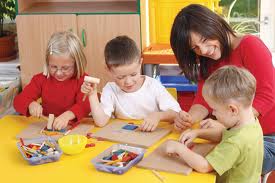 Critics of the new national curriculum scheduled to begin in primary and some secondary schools in September 2014 say that it is too soon, that no one is prepared enough yet, and that it will cause chaos where schools and their teachers are not ready. Advocates of the changes state they are glad that the national curriculum is finally being given an overhaul which will put the UK back on track with the rest of Europe. The proposed changes will be taught to children aged between 5 and 14 years old, but secondary schools can opt out if they wish.
Critics of the new national curriculum scheduled to begin in primary and some secondary schools in September 2014 say that it is too soon, that no one is prepared enough yet, and that it will cause chaos where schools and their teachers are not ready. Advocates of the changes state they are glad that the national curriculum is finally being given an overhaul which will put the UK back on track with the rest of Europe. The proposed changes will be taught to children aged between 5 and 14 years old, but secondary schools can opt out if they wish.
But what implications do these changes hold? Teachers have been used to teaching the set curriculum for years with little need for in-depth teaching. Many now have no choice but to go back to school themselves in order to revise the subjects before attempting to teach them to the children.
Among the subjects being given an overhaul is English, with a new focus on grammar, spelling and vocabulary. Rigorous spelling lists will be given to children in various age groups. It will be expected of children between the ages of 11 and 14 years old to have learned at least two Shakespeare plays. Younger children won´t get off lightly either as seven-year-olds will be taught about adverbs, conjunctions, subordinate clauses and prepositions while eight-year-olds will learn about fronted adverbials. Nine-year-olds will find out the uses of modal verbs and relative clauses and ten-year-olds will study using the subjunctive form of verbs as well as the relationship between subject and object, active and passive. Does this all sound like double Dutch to you?
To make sense of it all, take some refresher English courses in Leicester or a city near you to gain a better understanding of the complexities of the English language.
 Samantha enjoyed a challenge, which was a good job really considering a huge one loomed before her! Her husband had been offered a job in southern Spain and it was too good an opportunity to miss, so they´d decided to relocate there with their three children.
Samantha enjoyed a challenge, which was a good job really considering a huge one loomed before her! Her husband had been offered a job in southern Spain and it was too good an opportunity to miss, so they´d decided to relocate there with their three children.
The plan was that, once she´d got the kids settled in school, she´d earn a bit of cash herself by teaching English to the Spanish children. She´d get to know the other parents and offer extra tuition after school to help the kids with their speaking skills.
In order to do this, however, Samantha had to gain a formal qualification known as the TEFL, Teaching English as a Foreign Language. She knew a couple of people who had already gained their TEFL qualification and they´d warned her that, despite being born and bred Brits who´d spoken English all of their lives, they´d struggled with some of the grammar aspects and found the terminology relating to teaching English a little tricky. Samantha knew this was only natural as people get used to speaking without thinking and become lazy in their knowledge of language construction, but she thought she´d better brush up on her skills nonetheless.
She found some private one-to-one English language training classes in Coventry where she lived. The tutor was willing to structure the lessons around the requirements needed for Samantha to be able to pass the TEFL teacher training course. Soon afterwards, thanks to the expert tuition she received, Samantha was confident enough that she could complete the TEFL course with ease.
Now, with her TEFL certificate firmly in her hand, Samantha is preparing to make the move to Spain and is looking forward to the teaching challenges that await her there!
The British government plans to change the education system making it compulsory for children to learn a language in school from the age of seven. This proposal has been put forward because of the decline in British students choosing to learn another language. ‘In 2010, 43% of GCSE pupils were entered for a language, down from a peak of 75% in 2002.’ Along with an emphasis being placed on foreign languages the government intends to improve British children’s grasp of the English language. Specific focus will be placed on grammar as well as ‘a systematic approach to the teaching of phonics – the sounds of letters and groups of letters – would be advocated to help pupils to become fluent readers and good spellers…’
I think that it is important for Britain to advocate language learning from a young age. In many jobs fluency in another language not only makes you stand out from the crowd but is also becoming a necessity to be employed in the field. Britain needs to make language learning an attractive prospect to the younger generation or else it risks being left behind in an increasingly globalised world.
Quotes via the BBC Website.
Quite some time ago on this blog, I admitted to not being completely au fait with apostrophes.
Nothing much has changed in the intervening time, mostly because I don’t have the time to sit down and memorise the rules. I still have no problem with contractions (“it is”, “it’s”) but struggle sometimes with possession.
I have a feeling that this will change though, as I’ve discovered an excellent new resource. This comic from The Oatmeal is both handy and amusing – the best kind of reference tool! An example: “I saw two kittens riding a goat. Goats are great for transportation.” Very cute illustrations too. Take a look!
I think it’s a given that this blog loves languages. And being a lover of languages, I love reading blogs about languages.
Over at the Mental Floss blog, Miss Cellania has complied a list of some great blogs dedicated to the English language. I particularly enjoy blogs that point out the many mistakes people make (Apostrophe Abuse is a great example), but if you prefer to celebrate language instead, there’s a few links for you too.
Mental Floss invites you to share more blogs in the comments, and so do I!
 Bad news if your grammar is terrible – even monkeys can recognise your mistakes.
Bad news if your grammar is terrible – even monkeys can recognise your mistakes.
Well… sort of. Researchers have said that a particular kind of monkey are able to hear if the order of syllables in a word is “wrong”.
The cotton-top tamarins were first familiarised with two-syllable terms, and then tested the following day to see how they reacted to familiar and unfamiliar word patterns. The study found that the monkeys “looked to the speaker” when unfamiliar words were presented.
Of course, the researchers weren’t merely having fun playing with monkeys, the results have implications for humans also:
Marc Hauser, who was also involved in this study, told BBC News that the results showed how human language had incorporated memory processes that were not “language-specific”.
“Simple temporal ordering is shared with non-human animals,” he said. “This has an important role. In bird song or whale song, for example, there’s a temporal ordering to the notes and that’s critical for communication.”
And it goes beyond that. “In primates, this ordering is vital for learning,” explained Professor Hauser. “In tool use, primates learn from each other that you do this first, then you do that, then it’s that.”
Professor Hauser described how evident this innate ability is when a child learns language.
“As a child learns to use the past tense,” he said, “they may generalise and use a suffix wrongly, but they will never generalise in the wrong direction. “You never hear them say ed-walk instead of walked.”
Read the full article here, or the full research paper here.
 I am happy to admit that I am occasionally confused by apostrophes, something I attribute to spending my formative years at schools where calligraphy with the headteacher was sometimes more important than grammar.
I am happy to admit that I am occasionally confused by apostrophes, something I attribute to spending my formative years at schools where calligraphy with the headteacher was sometimes more important than grammar.
Anyway, now that I’m all grown up and like to see writing that is grammatically correct, I’ve been working hard to make sure I always put the apostrophe in the right place. Apostrophes have two uses, and one of them I am fine with: showing the omission of letters (e.g. “it’s”/”it is”). It’s the other that I, and probably most others, stumble over.
The other use of the apostrophe is to show possession (“the girl’s pen”). The most useful (although a little childlike!) way I have found for remembering the correct grammar is thinking of the tail of the apostrophe pointing to whoever has ownership. So:
The pen of the girl = the girl’s pen. There is only one girl, so the apostrophe is pointing to the word ‘girl’.
The pen of the girls (more than one girl) = the girls’ pen. There is more than one girl, so the apostrophe is pointing to the plural of girl, ‘girls’.
Try testing your apostrophe knowledge here.
 Critics of the new national curriculum scheduled to begin in primary and some secondary schools in September 2014 say that it is too soon, that no one is prepared enough yet, and that it will cause chaos where schools and their teachers are not ready. Advocates of the changes state they are glad that the national curriculum is finally being given an overhaul which will put the UK back on track with the rest of Europe. The proposed changes will be taught to children aged between 5 and 14 years old, but secondary schools can opt out if they wish.
Critics of the new national curriculum scheduled to begin in primary and some secondary schools in September 2014 say that it is too soon, that no one is prepared enough yet, and that it will cause chaos where schools and their teachers are not ready. Advocates of the changes state they are glad that the national curriculum is finally being given an overhaul which will put the UK back on track with the rest of Europe. The proposed changes will be taught to children aged between 5 and 14 years old, but secondary schools can opt out if they wish.

 Bad news if your grammar is terrible – even monkeys can recognise your mistakes.
Bad news if your grammar is terrible – even monkeys can recognise your mistakes.